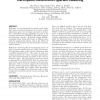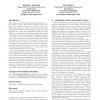53 search results - page 4 / 11 » Fuzzy logic and the Internet (FLINT): Internet, World Wide W... |
WWW
2007
ACM
14 years 9 months ago
2007
ACM
Semantic similarity measures play important roles in information retrieval and Natural Language Processing. Previous work in semantic web-related applications such as community mi...
WWW
2007
ACM
14 years 9 months ago
2007
ACM
Current keyword-oriented search engines for the World Wide Web do not allow specifying the semantics of queries. We address this limitation with NAGA1 , a new semantic search engi...
HT
1996
ACM
14 years 21 days ago
1996
ACM
HyPursuit is a new hierarchical network search engine that clusters hypertext documents to structure a given information space for browsing and search activities. Our content-link...
WWW
2005
ACM
14 years 9 months ago
2005
ACM
Many modern natural language-processing applications utilize search engines to locate large numbers of Web documents or to compute statistics over the Web corpus. Yet Web search e...
CEAS
2006
Springer
14 years 8 days ago
2006
Springer
Just as email spam has negatively impacted the user messaging experience, the rise of Web spam is threatening to severely degrade the quality of information on the World Wide Web....


